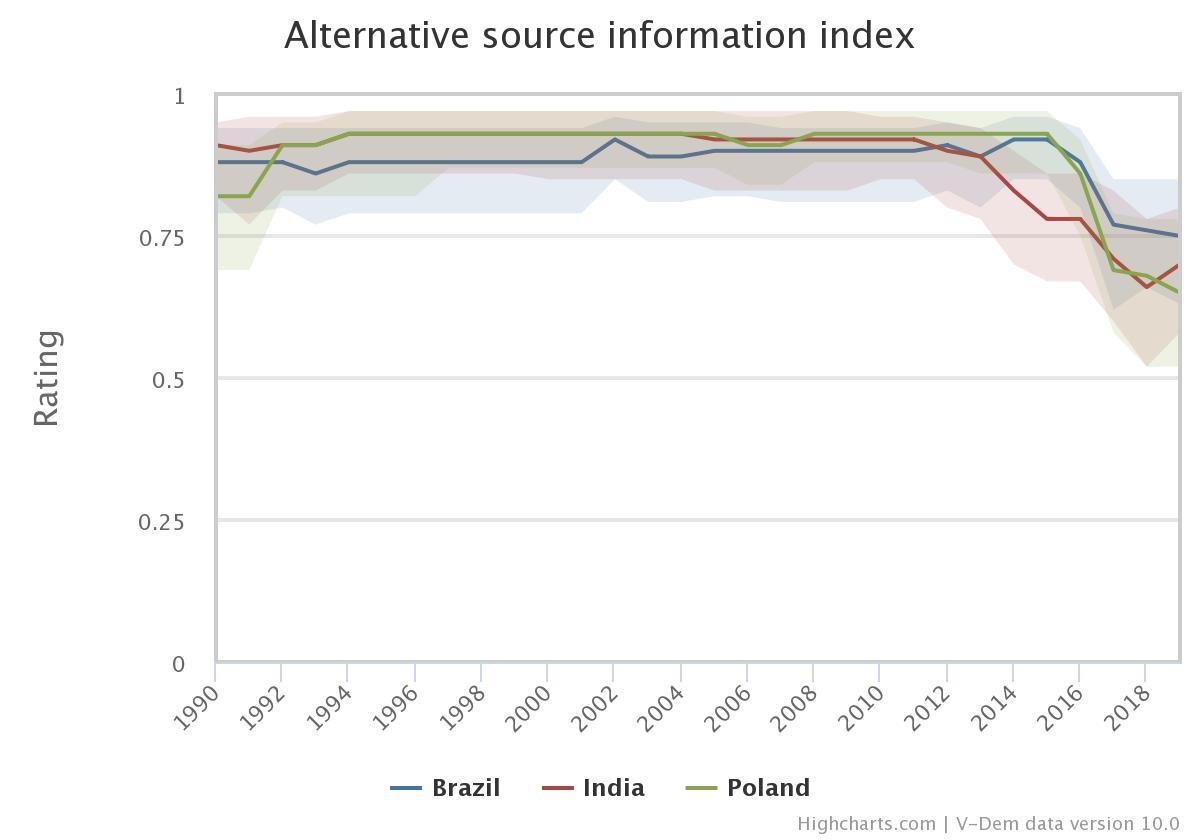Alternative Sources of Information: India, Poland, and Brazil
By: Graham Baker
Mar 02, 2021
A free media depends not only on the right to publish stories, but also the ability to accurately report on the policies and practices within a country, free of reprisal. In recent years, democratic backsliding in India, Brazil, and Poland has corresponded with degradation of media freedoms and limits on access to information. In all three countries, leaders have met unfavorable reports with contempt, state-sponsored violence, and legal challenges designed to occlude their unfavorable behavior. In this week’s graph, we focus on trends in the alternative sources of information index for these three countries.
The alternative sources of information index measures journalists’ ability to report information critical of the regime, cover opposition parties without bias, and represent all political viewpoints within a country. The index ranges from 0 to 1, with higher values representing greater access to alternative sources of information.
After the Cold War, Brazil and India exhibited high levels of alternative sources of information, scoring 0.85 and 0.89, respectively. By 1992, the Polish press had also substantially liberalized, scoring a 0.91. In 2014 India’s score fell to 0.83. Brazil and Poland also began declining in 2016. As of 2019, Poland scores the lowest of the three countries (0.65), followed by India, where the declines have been less pronounced (from .78 to .70 from 2016-2019). Meanwhile, Brazil has decreased by nearly 15%, from 0.88 down to 0.75.
India’s decline in media freedoms aligns with the rise of Modi’s Hindu national government, which has used both legal means and extralegal force against journalists who do not toe the line. Freelance journalist Jagendra Singh died from burn wounds after being allegedly set on fire by police at the command of a local government minister (Lee et al. 2017, p. 8). The movement of journalists has been restricted, preventing accurate reporting. Prohibitions against journalists venturing near the line of control in Kashmir, under the guise of national security, has made reporting on the controversial subject nearly impossible (ibid.). Media outlets have become increasingly centralized, with few independent journalists able to serve a watchdog function on larger conglomerates (ibid.).
Supporters of Brazil’s current president Jair Bolsonaro harassed and physically threatened reporters for their work (Human Rights Watch 2018). Bolsonaro has repeatedly attacked the media and disseminated misinformation, leveraging his position and widespread base of support (Medeiros 2020, p. 5). Officials have sowed doubt in official data of deforestation and fire within the Amazon, a point of critique of the Bolsonaro government; those seeking to report the information have been fired. (Deutsche Welle 2020). Glen Greenwald, the Pulitzer prize winning journalist and resident of Brazil, has received death threats and faced intimidation from Congress, President Bolsonaro, and the police, after he published criticism of the Justice Minister (Kaiser 2019). Journalists and media outlet owners also face violence, with multiple media company owners killed in Rio de Janerio in 2019 (ibid.).
Polish press freedoms have fallen since the election of the “Law and Justice” party in 2015 (Stolarek 2020). The party has centralized control of public media, hiring loyal reporters and firing critics (ibid.). Polish leaders’ use of libel lawsuits has had a chilling effect, with media companies increasingly sued in costly civil cases and journalists, such as Anna Wilk, can be banned from practicing journalism, face fines, and jailed for up to a year if found guilty of defamation (Committee to Protect Journalists 2019). Journalists have also been attacked publicly by government officials who deny detractors access and call for citizens to cancel subscriptions to deprecate outlets, placing further economic pressure on regime critics and silencing reporting prior to publication (Stolarek 2020). When these deterrents have failed, the government has sought to control independent media outlets, such as its partial control over the popular television channel PolStat (ibid.).
The dissemination of reliable information by unobstructed institutions is essential to the quality of a state’s democracy. The use of legal maneuvering and extra-legal violence to silence dissent and limit accountability is one example of a worrying trend of democratic backsliding in the once healthy democratic systems of Brazil, India, and Poland.


